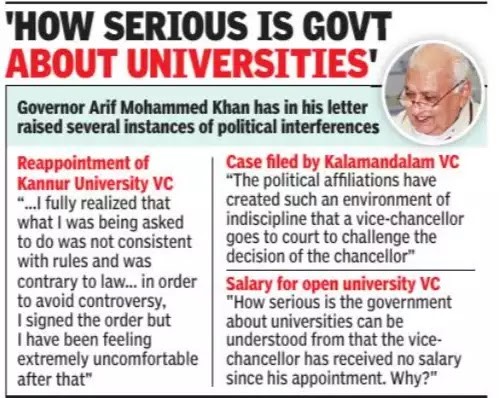Revisiting the Governor’s Role as Chancellor of State Universities
Syllabus:
GS – 2- Role of state Governor , Federal relations , Education system in India
Focus :
The article examines the role of Governors as Chancellors of State universities, highlighting its colonial origins, politicization, and challenges in governance. It discusses the implications for university autonomy, federalism, and academic freedom while exploring alternative governance models and reform recommendations aimed at reducing political interference and ensuring accountability, institutional self-governance, and academic excellence.
Historical Background
- Originated in 1857 with the establishment of universities in Calcutta, Bombay, and Madras.
- Governors of British presidencies were made ex-officio Chancellors to exercise control over universities.
- The model of “Governor as Chancellor” continued after Independence without reassessment.
- Designed to restrict university autonomy rather than promote it.
Governor’s Role as Chancellor
Powers of the Chancellor:
- Appointment of Vice-Chancellors.
- Nomination of members to university bodies (e.g., Syndicate).
- Approval of delegated legislation under university laws.
- Presiding over convocations and other ceremonial duties.
Dual Role of the Governor:
- As per Article 163(1), Governors act on the advice of the Council of Ministers for constitutional functions.
- As Chancellors, they act independently, unless otherwise mandated by statutes.
Challenges with the Current System
Politicization of the Governor’s Office:
- Increasing appointment of political figures as Governors.
- Post-1967, Governors became instruments of the Central government, undermining neutrality.
- Over 52% of Governors have been politicians (1950-2015).
Erosion of University Autonomy:
- Politicized appointments and decisions.
- Conflicts between Governors and State governments, especially in Opposition-ruled States.
Governance Issues:
- Delays in appointing Vice-Chancellors, causing administrative paralysis.
- Dual accountability to Governors and State governments creates confusion.
- Lack of academic expertise among Governors leads to questionable decisions.
Comparing Governor and President’s Role in Universities
Governor in State Universities:
- Exercises unilateral authority, often bypassing State Education Ministries.
- State university laws do not mandate legislative oversight of delegated legislation.
President in Central Universities:
- Acts as Visitor, consulting the Ministry of Education.
- Appointments and statutes are subject to parliamentary oversight.
Insights from Various Commissions
- Rajamannar Committee (1969-71): Suggested Governors should act on the advice of State governments in their statutory roles.
- Sarkaria Commission (1983-88): Recommended Governors consult Chief Ministers while retaining independent judgment in university matters.
- Punchhi Commission (2007-10):
- Advocated limiting Governors to constitutional responsibilities.
- Proposed appointing academicians or experts as Chancellors to ensure academic independence.
Proposed Reform Models
- Ceremonial Role of Governors:
- Mandating Governors to act on the advice of State governments.
- Implemented in Gujarat (1978), Karnataka (2000), and Maharashtra (2021).
- Chief Minister as Chancellor: Proposed in West Bengal and Punjab (2023 Bills awaiting Presidential assent)
- State-Appointed Chancellor Model:
- Adopted in Telangana (2015); similar Bill passed in Kerala (2022, awaiting assent).
- Appointees must be distinguished academicians or public figures, excluding politicians.
- University-Elected Chancellor Model: Universities like Oxford, Cambridge, and Edinburgh allow alumni and university bodies to elect ceremonial Chancellors.
- Executive Council-Appointed Chancellor: Followed in universities in the UK (e.g., Birmingham), Canada, and Australia.
Key Recommendations for Reform
- Dismantling Colonial Practices:
- Divesting Governors of their role as Chancellors.
- Aligning governance models with global best practices.
- Ensuring Accountability:
- State universities should be fully accountable to elected State governments.
- Reforming university laws to require legislative oversight for delegated legislation.
- Reducing Political Interference:
- Appointing eminent academicians or public figures as Chancellors.
- Preventing Governors from prioritizing the Centre’s political agenda over university autonomy.
- Fostering Institutional Autonomy:
- Empowering university bodies to elect or appoint Chancellors transparently.
- Promoting academic freedom and governance excellence.
Associated Article
Mains UPSC Question GS 2
Critically analyze the role of Governors as Chancellors of State universities in India. Discuss the challenges posed by the current system and suggest reforms to balance university autonomy, federalism, and academic excellence.(250 words).




